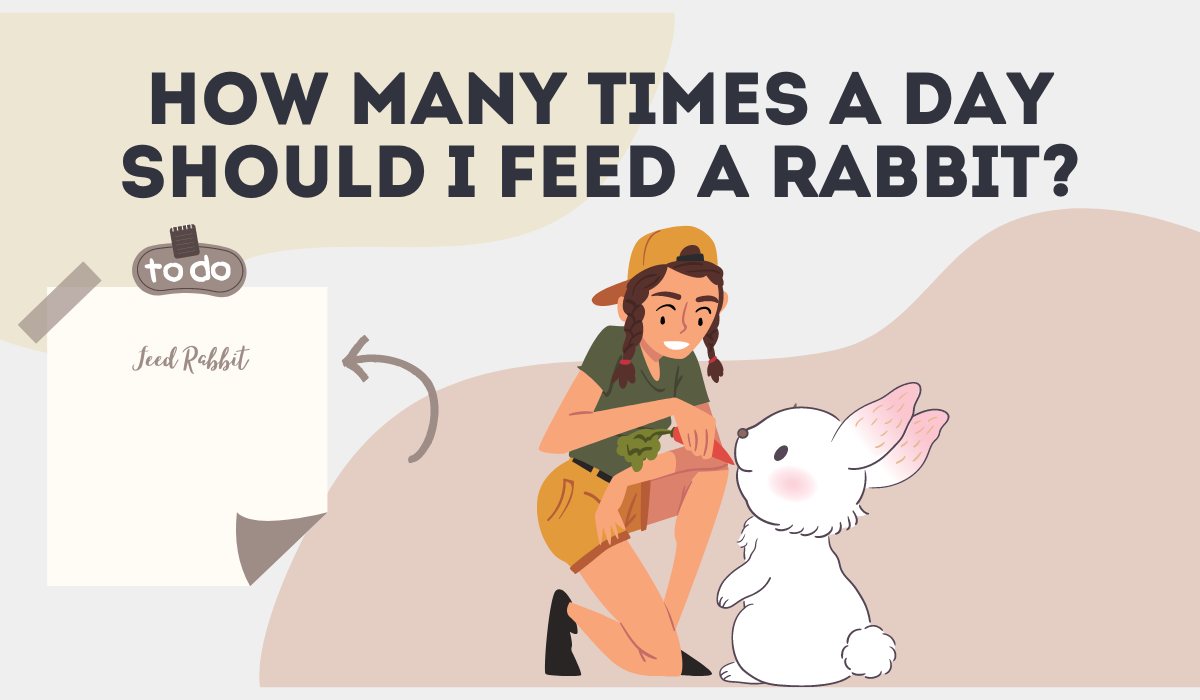Rabbits are adorable, fluffy creatures that make wonderful pets. However, taking care of a rabbit requires a lot of responsibility and knowledge, particularly when it comes to their diet. One of the most common questions that rabbit owners ask is how many times a day should they feed their furry friend.
The answer to this question is not straightforward, as it depends on several factors, such as the rabbit’s age, weight, and activity level. Generally, rabbits should have access to food at all times, as they are grazers and need to eat frequently to maintain their health. However, it’s important to ensure that they are not overeating or consuming foods that are not suitable for them.
So, how many times a day should you feed your rabbit? Let’s explore this topic in more detail and look at the different factors that can influence your rabbit’s feeding schedule.
Feeding Schedule
Age of the Rabbit
According to Beginners Guide, the general rule of thumb for how much to feed a rabbit is about one ounce per pound of body weight each day. However, this may vary depending on the type of food you give your bunny. Young rabbits (under 7 months old) should be fed alfalfa hay and pellets, which are high in protein and calcium, to support their growth. They should be fed three times a day, with unlimited access to hay and fresh water. At approximately 7 months, they must be weaned onto an adult diet, as described below, since their growth slows down.
Type of Diet
Adult rabbits (over 6 months old) should be fed a diet consisting of hay, fresh vegetables, and a limited amount of pellets. Fresh hay should always be available, and they should be provided with fresh water daily. As nibblers, they should have food available at all times. According to theRSPCA, rabbits must have an adult-sized handful of safe, washed leafy green vegetables, herbs, and weeds daily. A variety of greens should be offered daily – ideally 5-6 different types, such as cabbage, kale, broccoli, parsley, and mint. New types of greens should be introduced gradually, in small amounts, to avoid potential stomach upsets. Pellets should be limited to 1/4 cup per day of a high-quality brand that is low in protein and high in fiber.
It is important to note that rabbits have sensitive digestive systems and can react adversely to sudden changes in their diet. Any changes to their diet should be made gradually over a period of 1-2 weeks.
Portion Control
When it comes to feeding rabbits, portion control is essential to ensure they receive proper nutrition and maintain a healthy weight. This section will cover the amount of food and frequency of feeding that is recommended for rabbits.
Amount of Food
The amount of food a rabbit needs depends on their body weight, age, and activity level. A general guideline is to feed rabbits about one ounce of food per pound of body weight each day. However, this may vary depending on the type of food given to the rabbit. For example, if the rabbit is mostly fed hay and vegetables, they will not need as much as if they were eating pellets.
It is important to note that rabbits have sensitive digestive systems and can react adversely to sudden changes in their diet. Therefore, any changes to the amount of food given to the rabbit should be made gradually over a period of a few days.
Rabbits should also have access to fresh water at all times. A clean water bottle or bowl should be provided and refilled daily.
Frequency of Feeding
Rabbits are grazers and should have food available to them at all times. As nibblers, they should have food available at all times. Therefore, it is recommended to feed rabbits small meals throughout the day rather than one large meal.
A standard guideline is to provide about 1/4 cup of pellets per 6 pounds of body weight per day. Several servings of vegetables are also required (2 cups per 6 pounds of body weight daily). It is important to choose dark, leafy greens and feed at least three different kinds daily. Iceberg or other light-colored varieties are not nutritious.
Rabbits must have an adult-sized handful of safe, washed leafy green vegetables, herbs, and weeds daily. A variety of greens should be fed daily, ideally 5-6 different types, such as cabbage, kale, broccoli, parsley, and mint. New types of greens should be introduced gradually, in small amounts, to avoid potential stomach upsets.
Signs of Overfeeding a Rabbit
It can be easy to overfeed a rabbit, but doing so can lead to health problems such as obesity and digestive issues. Here are some signs that a rabbit may be overfed:
- Weight gain: Overfeeding can cause a rabbit to gain weight quickly. It’s important to monitor a rabbit’s weight and adjust their diet accordingly.
- Soft stool: Overfeeding pellets, which are low in fiber and high in carbohydrates, can cause an overgrowth of abnormal bacteria in the gastrointestinal tract, leading to soft stool.
- Decreased activity: An overfed rabbit may become lethargic and less active.
- Dental problems: A diet high in pellets and low in hay can cause dental problems such as overgrown teeth.
- Behavioral changes: Overfeeding can cause a rabbit to become more aggressive, territorial, or anxious.
To avoid overfeeding, it’s important to provide a balanced diet of hay, fresh vegetables, and a limited amount of pellets.
Special Considerations
Feeding rabbits requires some special considerations depending on their age, health, and other factors. Here are some things to keep in mind:
Senior Rabbits
As rabbits age, their dietary needs change. Senior rabbits require a diet that is lower in calories and higher in fiber to prevent obesity and other health problems. It is recommended to feed senior rabbits unlimited hay, a limited amount of pellets, and fresh vegetables as treats.
Pregnant or Nursing Rabbits
Pregnant or nursing rabbits require a diet that is higher in protein and calories to support the growth and development of their young. They should be fed unlimited hay, a larger amount of pellets, and fresh vegetables as treats. It is important to monitor their weight and adjust their diet accordingly.
Ill or Injured Rabbits
Rabbits that are ill or injured may require a special diet to aid in their recovery. It is important to consult with a veterinarian to determine the appropriate diet for your rabbit’s specific condition. In general, it is recommended to offer unlimited hay, a limited amount of pellets, and fresh vegetables as treats.
Conclusion
Feeding a rabbit is an important aspect of caring for a pet rabbit. As per the search results, most rabbits can be fed once a day, but it is important to monitor their weight and adjust the amount you are feeding as necessary. If your rabbit seems to be gaining or losing weight, try feeding them twice a day instead of just once. It is important to provide fresh water and hay to your rabbit at all times. As nibblers, they should have food available at all times.
Rabbits require up to 20% fiber and 45% carbs in their daily diet. These foodstuffs do an excellent job of satisfying those needs. Rabbits can also eat other greens, albeit in limited quantities. These animals have sensitive digestive systems and can react adversely to sudden changes in their diet. Therefore, it is important to introduce any new foods gradually and monitor their reaction to it.
It is also important to note that rabbits are natural grazers, so they like to eat a lot. Because of that, most of the time, rabbits are unaware that they have eaten enough food. So owners need to be aware of how much food they give their pet rabbits. One exception to the rule is hay. Hay should always be available to your rabbit, and they should be able to eat as much hay as they want.
FAQ
How much food should a rabbit eat a day?
The amount of food a rabbit should eat per day depends on its age, weight, and activity level. A general rule of thumb is that a rabbit should eat approximately 1/4 to 1/2 cup of pellets per day per 5 pounds of body weight. They should also have unlimited access to hay, such as Timothy hay, which is essential for digestive health.
What are the best times to feed a rabbit?
Rabbits are crepuscular animals, meaning they are most active during dawn and dusk. As such, it is recommended to feed your rabbit twice a day, once in the morning and once in the evening, to coincide with their natural feeding habits.
Can you overfeed a rabbit?
Yes, you can overfeed a rabbit, which can lead to obesity and health problems. Rabbits have sensitive digestive systems and require a specific diet and portion control. Overfeeding can also cause a lack of appetite, digestive issues, and dental problems.



